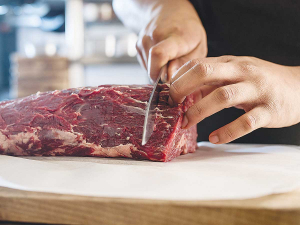NZ red meat exports up 6% as global supply tightens
Tighter beef and lamb production globally have worked to the advantage of NZ, according to the Meat Industry Association (MIA).
 The meat industry is warning that processing and exporting jobs are in jeopardy unless specialist migrants are allowed to remain in the country.
The meat industry is warning that processing and exporting jobs are in jeopardy unless specialist migrants are allowed to remain in the country.
Nearly half of our country’s meat exports are at risk unless there is urgent action by government to allow migrant workers to stay in New Zealand.
That’s the warning from NZ’s meat processing sector organisation the Meat Industry Association (MIA). It claims meat processing and exporting jobs are in jeopardy unless specialist migrants are allowed to remain in the country.
“New Zealand’s meat processing and exporting sector faces being forced to limit production and let people go unless the Government recognises the essential role of its skilled migrant workforce,” MIA chief executive Sirma Karapeeva says.
She warns that the loss of halal processing people – alongside hundreds of other essential meat workers – could result in reduced production and job losses in the sector.
Meat processing is NZ’s largest manufacturing industry and more than 45% of our total red meat exports are halal certified.
However, under the current rules, around a third of the country’s 250 essential halal processing workers will have to leave New Zealand next year due to the Government’s one-year stand-down policy.
“Most of the 42 halal processing plants in New Zealand now operate between 10-12 months per year,” Karapeeva explains. “A shortage of skilled halal processing people could result in production at many plants being limited to six months in the year, which would mean processing of livestock for farmers is severely disrupted and employees might be let go.”
She says under the Government’s one-year stand down policy, which applies to low skilled workers, 80 halal processing people and at least 260 other essential meat workers currently working in New Zealand will be forced to leave.
“Halal production is a key aspect of the industry’s approach to meeting consumer requirements globally. These skilled people are absolutely critical to sustain the entire industry of 25,000 workers.”
Karapeeva says while the industry’s preference is always to employ New Zealanders from local communities, that is not easy in the case of halal slaughtermen – despite more locals looking for jobs in the post Covid environment.
“Export demand for halal products means we have a high need for certified practising Muslim processing people and these are highly specialised roles,” Karapeeva explains.
“While we recruit as many as we can domestically, it significantly falls short of our need. That means we have no option but to look to migrants to fill some 150 roles each year.”
The industry is urging the Government to extend the time that skilled migrant workers are permitted to remain and work in New Zealand. Its request for an exemption to roll over the current AIP for 12 months to keep current halal slaughterers in New Zealand has also been refused.
“The current immigration policy settings would have significant adverse consequences for our industry,” Karapeeva adds. “It means we would not be able to operate at optimum capacity or deliver the full economic and social benefits to the country during the recovery.”
The meat processing and exporting sector collectively generate $12 billion in income per year for the country. It is also responsible for $4.6 billion in household income and represents approximately a fifth of New Zealand’s productive sector.
“We have tried to engage constructively with officials,” Karapeeva adds.
“However, progress has been slow and the industry is running out of time.”
A New Zealand dairy industry leader believes the free trade deal announced with India delivers wins for the sector.
The Coalition Government will need the support of at least one opposition party to ratify the free trade deal with India.
Primary sector leaders have welcomed the announcement of a Free Trade Agreement between India and New Zealand.
At Pāmu’s Kepler Farm in Manapouri, mating has wrapped up at the across-breed Beef Progeny Test.
More than 150 people turned up at Parliament recently to celebrate the 20th anniversary of Horticulture New Zealand (HortNZ).
Biosecurity New Zealand says Kiwis should continue to keep an eye out for yellow-legged hornets (Vespa velutina) over the holiday season.